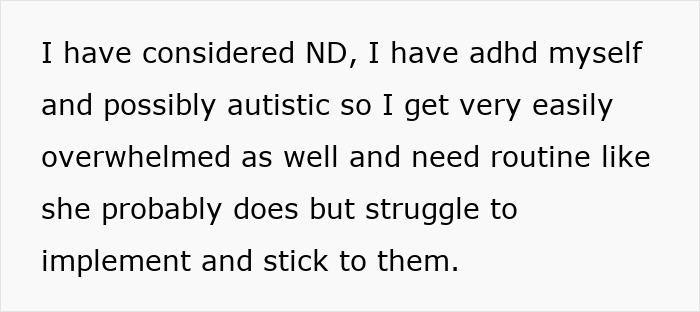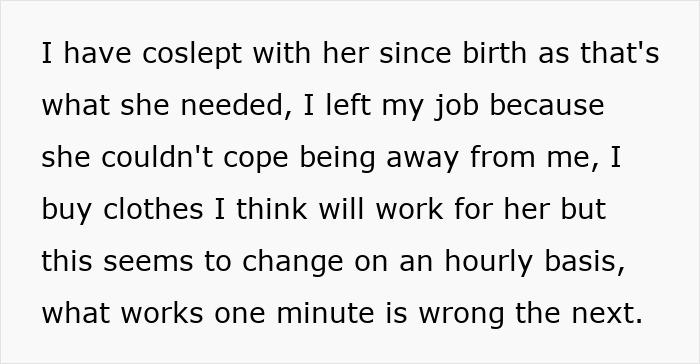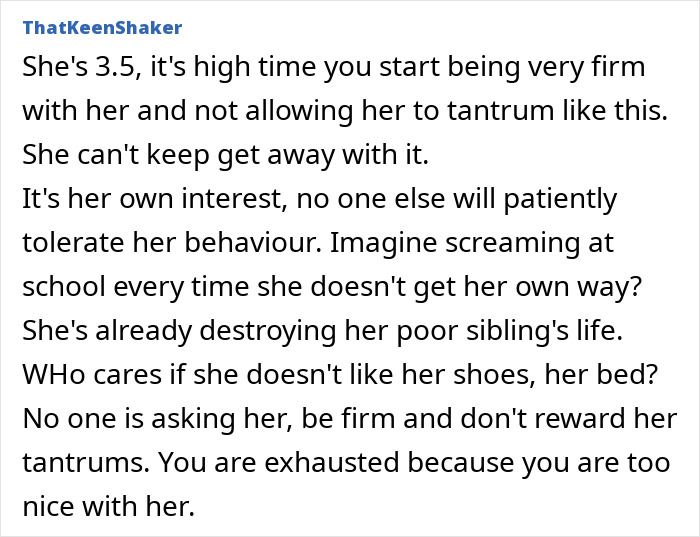You know that moment when you think parenting can’t possibly get any harder, and then your toddler decides to prove you wrong? Imagine every outfit being too tight or every car seat too loose, and then throw in screaming and endless meltdowns.
That’s life for today’s Original Poster (OP) who recently took to the internet to share her brutally honest story about raising her 3.5-year-old daughter, and honestly, every parent who’s ever felt on edge could probably feel this one in their soul.
More info: Mumsnet
Parenting is often described as the most rewarding job in the world, but anyone who’s raised a particularly challenging child knows it can also be one of the hardest

Image credits: prostooleh / Freepik (not the actual photo)
The author explained that her daughter has been extremely difficult since birth, constantly feeding, crying, and rarely sleeping





Image credits: Hoverflies

Image credits: Freepik / Freepik (not the actual photo)
She frequently experienced meltdowns, hits the author and her husband, her sister, and would resist clothing, shoes, and car seats





Image credits: Hoverflies

Image credits: prostooleh / Freepik (not the actual photo)
Despite these challenges, the author noted that her daughter could be happy, clever, and charming in other settings, leaving her confused





Image credits: Hoverflies

Image credits: Magic by Jelena / Freepik (not the actual photo)
She shared that for this reason, the family barely enjoyed activities together, as she often overlooked her first daughter while the relationship with her husband was strained





Image credits: Hoverflies

Image credits: The Yuri Arcurs Collection / Freepik (not the actual photo)
She is now concerned about possible underlying conditions, such as pathological demand avoidance or sensory issues




Image credits: Hoverflies
The overall experience has led to exhaustion, stress, and feelings of guilt as she expressed love for her child despite the frustration
From the very beginning, the OP shared that her little girl’s life has been full of intensity. If she wasn’t eating, she was crying. If she was awake, she was screaming. Sleep was a rarity, and peace was virtually non-existent. Everyday activities like getting dressed, traveling in the car, or simply being at home would often trigger long, intense meltdowns.
What made it more baffling for the OP was that there were also moments of sunshine. When her daughter was with others, she was all charm, bright, funny, and clever. It was this duality that left her feeling lost, wondering if she was missing something deeper beneath.
She shared that her patience was often stretched too thin, leaving her harsher than she would want to be. She then added that her relationship with her first daughter was suffering as she barely gave her any attention, and that her relationship with her husband was also strained.
This left the OP feeling guilty, admitting that she loved her daughter deeply but also imagined how peaceful life would be without the constant meltdowns.

Image credits: gzorgz / Freepik (not the actual photo)
The struggles described by the OP may reflect underlying neurodevelopmental or sensory differences in her child. According to Sparks Therapy, persistent distress in infants can be associated with sensory processing differences, autism spectrum disorder (ASD), or pathological demand avoidance (PDA).
Adding another layer to these challenges, children with neurodivergent traits sometimes engage in “masking”, a strategy described by Psychology Today. Masking involves suppressing natural behaviors, whether consciously or unconsciously, to appear more neurotypical and avoid negative attention or bullying. This may help explain why the OP’s daughter could be delightful in public yet highly distressed at home.
The stress of managing a child with intense needs can have serious consequences for parents as well. KidsHealth notes that chronic caregiver burnout is marked by physical, emotional, and mental exhaustion, including anxiety, depression, irritability, fatigue, and disrupted sleep or appetite.
The strain isn’t just from the workload, rather it also stems from the emotional burden of guilt, frustration, and isolation. Over time, prolonged stress can increase the risk of serious health issues such as heart disease, diabetes, and weakened immunity, illustrating just how overwhelming life can feel for parents in situations like this one.
Netizens expressed empathy for the OP and suggested her daughter might be neurodivergent, encouraging early assessment and professional support. They noted that her behavior could be a form of communication rather than deliberate misbehavior with some urging firmness and structure alongside understanding.
What do you think about this situation? What advice or perspective would you give someone going through this? We would love to know your thoughts!
Netizens encouraged the author to seek professional help, and reminded her that that parenting a challenging child can be exhausting but support is available







 Follow Us
Follow Us





